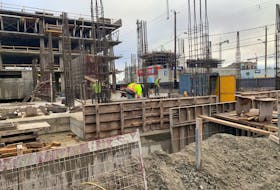NEW GLASGOW – Mike Muir says the old adage “It’s too good to be true” is keeping people from saving money on their home-heating costs.
A self-described geothermal activist, the Pictou County resident says he has worked the figures through various computer analysis programs and believes people are missing an opportunity to save large amounts of money when it comes to heating their homes or businesses.
“People tell me they can’t afford geothermal heat pumps because they are too expensive, but it’s not when you show them the money they will have in their pockets,” he said. “They don’t know about the energy-savings costs. Geothermal heating basically creates a moving company. It moves the heat from the ground outside into the home during the cold months and in the summer it takes the heat out of the house and puts it into the ground.”
Muir based his calculations on a 2,400-square-foot house, that is air-tight with R25 walls and R50 in the attic. He said the cost for heating this home and hot water for the next 20 years with a geothermal heat pump is approximately $37,633. This is in comparison to air–to-air heat pump that comes in around $81,880 and ETS off-peak electricity at $80,455. MacKinnon said the biggest difference is with oil heating (85 per cent efficiency) and air conditioning at $117,038 and electric baseboards at $124,312.
In the construction industry for years, Muir didn’t know anything about geothermal heating until someone asked him to look into it. After doing his own research and seeing the results first-hand, he was convinced it’s the most economical way for people to heat their homes or businesses.
However, he said, Nova Scotia is behind every other province when it comes to taking advantage of this heating alternative.
“Nova Scotia is so far behind on this because no one is spreading the word,” he said. “If you were living in a new modular home and I told you that you were going to spend $125,000 in heating your home for the next 20 years, you probably would say you couldn’t afford it. People don’t understand there is an alternative out there.”
Although he has the ability to install geothermal heating in homes and businesses, Muir stresses he is not sharing this information to drum up new business. He said there are reputable businesses in the county that install geothermal heat pumps across the province and he would like to see everyone’s business expand because it’s not only going to save people money, but it is better for the environment.
“This is green,” he added. “You are adding nothing to the environment. You are only taking it away. I want people to be aware of this because it is our future. Geothermal makes your home or business more comfortable, it costs less and it gives people added features they don’t already have.”
He said some people are skeptical of geothermal heating because they believe it will cost a lot to install in their homes. However, he said, costs have decreased over the years with new technology. He says homeowners can be installing geothermal heat pumps in their homes for as low as $20,000.
“People who have oil furnaces need very little upgrade because they have all the ducts in place,” he said. “It’s even better when their basement is unfinished because they don’t need to tear out walls to put any new duct work in.”
He added that geothermal heat also provides a constant source of heat and cooling in the home and also cuts down on the amount of dust.
“It is perfect for people who suffer from dust allergies,” he said. “People say they don’t need air conditioning, but once they feel the cool air in their home, they realize how nice it is.”
Muir added that a geothermal heat pump has a lifespan of about 25 to 30 years. He suggested people do their own research or talk to qualified installers who can give the information they need to make informed choices.








